In this article:
Flaxseed, which also goes by the name of linseed, has been cherished as one of the most health-protective plant foods on the planet for centuries now. Going as far back as the Babylonian era, flaxseed was cultivated by the ancient Egyptians, making it one of the oldest fiber crops known to man.
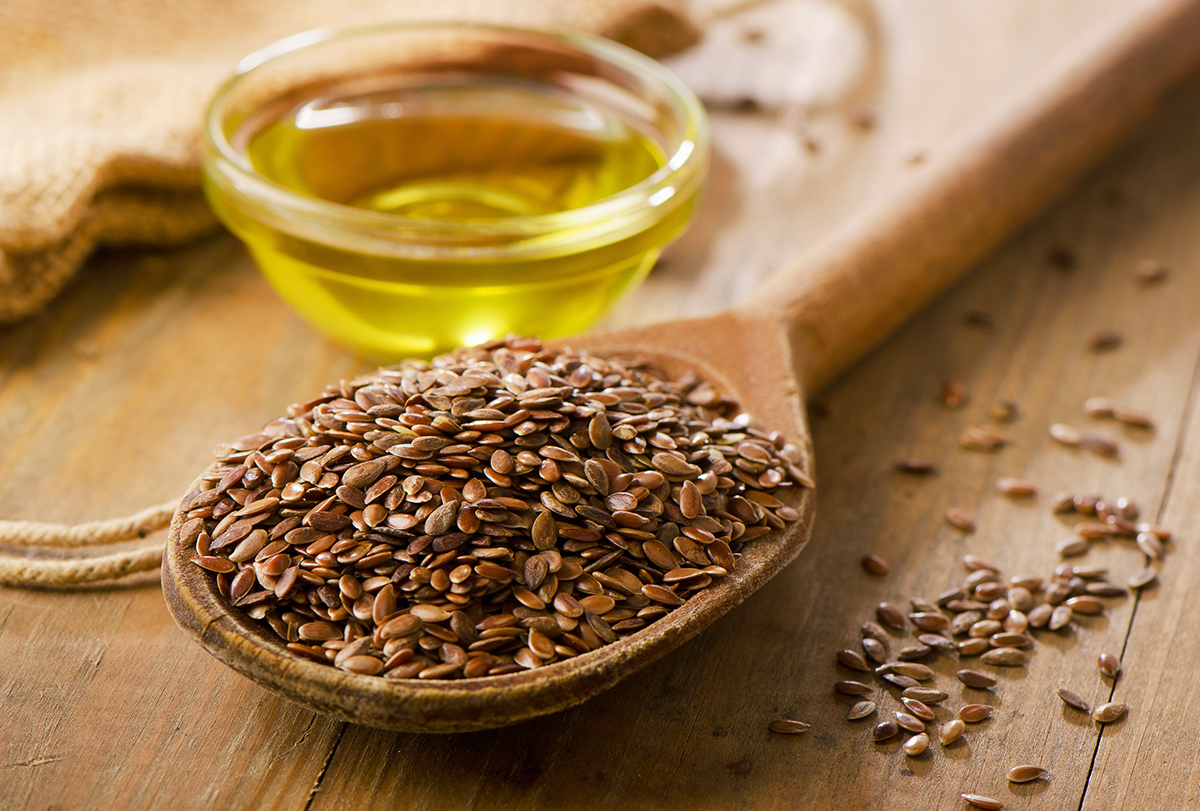
So many years down the line, these small, brown, tan, or golden seeds derived from the flax plant known as Linum usitatissimum continue to top the charts in terms of global patronage and health benefits.
Along with being one of the world’s first cultivated foods, flaxseeds have been a medicinal favorite for the Ayurvedic school of medicine for the longest time.
Flax or flaxseed oil can be found in a host of food products such as crackers, oatmeal, smoothies, baked goods, juices, milk and dairy products, muffins, dry pasta, macaroni, and meat products. More recently, there has been an unparalleled surge of flax-based products entering the market, and the consumers are just lapping them all up.
While flaxseeds have gained much traction for their nutty taste and earthy aroma, they also have many health benefits to boot. Health experts do not tire of extolling the nutritional virtues of flaxseeds that account for its myriad disease-fighting and health-promoting advantages.
Reasons Why Flaxseeds Are Good for Your Health
Here are 10 health benefits of flaxseeds.
1. Improves digestive health

Flaxseed is high in fiber, which is essential for a healthy digestive system. It can facilitate the passage of food through the intestines and even improve intestinal absorption of nutrients. The omega-3 fatty acids in flaxseeds also protect the lining of the digestive tract and help maintain gastrointestinal health. (1)
Plus, flaxseeds and flaxseed oil work as natural laxatives that can alleviate constipation. However, when consuming ground flaxseeds, make sure to also drink a good amount of water or it can cause side effects that could aggravate your tummy troubles and even cause intestinal blockage. (2)
Note: People suffering from diarrhea and chronic digestive disorders, such as irritable bowel syndrome, Crohn’s disease, and diverticulitis, should avoid flaxseeds because of its laxative effect.
2. Protects against heart disease
Flaxseeds contain many heart-healthy nutrients that can mitigate the risk of a number of cardiovascular ailments. It is rich in monounsaturated and polyunsaturated fats, including omega-3 fatty acids, which are important to keep your heart in optimal health. (3)
Large-scale epidemiologic studies suggest that people at risk for heart disease benefit from eating fatty fish and plant sources of omega-3. Some plant-derived omega-3 fatty acids are found in tofu, soybeans, walnuts, canola oil, and flaxseeds and their oils. (4)
Plus, flaxseeds can stave off heart disease and stroke by reducing the buildup of plaque in the arteries and inflammation, which is known to promote hardening of the arteries.
You can include ground flaxseeds in your diet for a healthy heart.
3. Eases menopausal symptoms
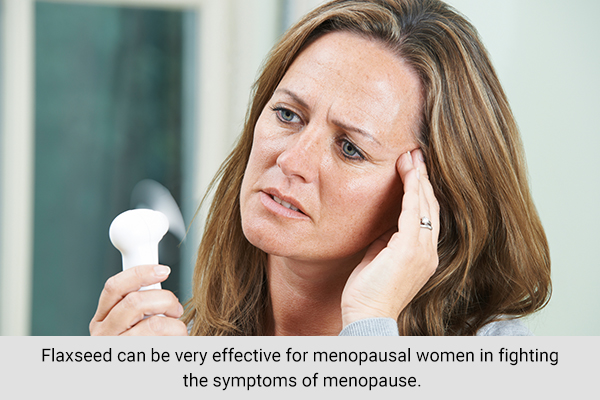
A 2013 study found that flaxseeds can be very effective for menopausal women in fighting the symptoms of menopause. The lignans in flaxseeds have estrogenic properties that can help reduce hot flashes, mood disturbances, and vaginal dryness. (5)(6)(7)
Furthermore, flaxseeds can help menstruating women maintain a regular cycle and promote fertility.
While the optimum dosage to maximize these health perks of flaxseeds is yet undetermined, current health experts stipulate no more than 1 to 2 tablespoons of ground flaxseeds a day. (8)
4. Lowers bad cholesterol
Regular intake of flaxseeds can help bring down your bad cholesterol, or low-density lipoprotein (LDL), levels.
A study published in Nutrition Research demonstrated the effectiveness of the daily consumption of 100 mg of flaxseeds in reducing blood cholesterol levels and lowering the risk of liver disease in men with moderately high levels of cholesterol. (9)
Several flavonoids found in flaxseeds help lower the levels of LDL and may also reduce your risk of heart disease. Flaxseeds also contains phytosterols, which are structurally similar to cholesterol and thereby compete with and inhibit the absorption of cholesterol in the intestines.
Consume 2 to 4 tablespoons of ground flaxseeds daily to help lower your LDL level.
5. Promotes weight loss

The three main components in flaxseeds that aid in weight loss are omega-3 essential fatty acids, fiber, and lignans. Plus, flaxseeds have B vitamins, potassium, magnesium, and zinc, which are essential in weight loss.
Flaxseed’s capability as a weight loss agent was further highlighted by a study demonstrating the favorable effect of flaxseeds consumption (>30g/day) on shedding the extra weight, observed among overweight and obese people. (10)
When it comes to weight loss, use ground flaxseeds rather than whole ones. Sprinkle it on your salads, soups, yogurt, smoothies, or any vegetable or mixed juice.
6. Stabilizes blood sugar
Daily intake of flaxseeds can improve blood sugar levels in people who have type 2 diabetes. A 2007 study published in the Public Library of Science One found that people who consumed flaxseed-derived lignan supplements (360 mg lignin/day) for 12 weeks had lower blood sugar levels. (11)
Plus, flaxseeds has alpha-linolenic acid, protein, and fiber, which are important for controlling high blood sugar. Maintaining a normal blood sugar level can, in turn, prevent complications such as kidney failure and can reduce the risk of heart disease.
You can consult your doctor and take flaxseeds along with your medicines to control diabetes. Keep monitoring your blood sugar levels to avoid the risk of hypoglycemia, or low blood sugar.
7. Aids detoxification
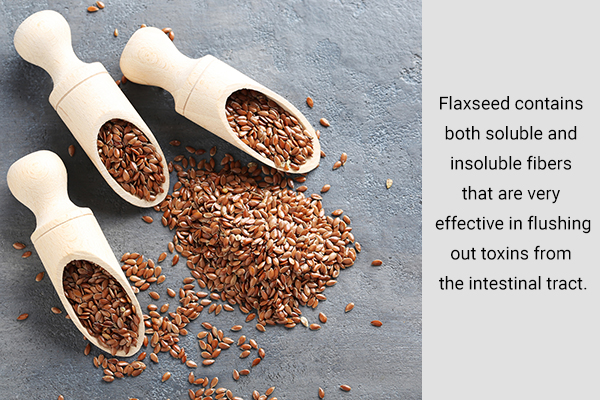
The main purpose of detoxifying your body is to make sure harmful toxins, cholesterol, and other waste products processed by the liver are eliminated properly. Flaxseeds contains both soluble and insoluble fibers that are very effective in flushing out toxins from the intestinal tract. (1)
Plus, flaxseeds is loaded with essential fatty acids, particularly omega-3 fatty acids, which are essential for a number of cleansing functions and maintaining a healthy immune system.
When your body is free of toxins, you are less likely to suffer from chronic fatigue, weakness, inflammation, and congestion.
How to use:
- You can use both whole and ground flaxseeds for detoxification.
- Soak 1 tablespoon of whole flaxseed in 1 cup of water overnight.
- The next morning, eat both the seeds and gel.
- Repeat daily for 2 weeks.
- You can also add 1 tablespoon of ground flaxseeds to any green detox smoothie.
8. Solves hair problems
Flaxseeds is rich in omega-3 fatty acids that nourish hair follicles to make them strong and healthy.
The vitamin E in flaxseeds provides nourishment to the hair roots, shafts, and scalp. Thus, flaxseeds come packed with wholesome goodness for your hair and help treat hair loss and prevent baldness. In fact, it can help people recover from psoriasis-related hair loss.
So, include freshly ground flaxseeds or flaxseed oil in your regular diet. Those with curly and frizzy hair can also use a hair gel prepared by boiling flaxseeds in water.
9. Makes skin healthy

The healthy fats and B vitamins in flaxseeds and flaxseed oil are beneficial for the skin. Flaxseeds can help reduce dryness and flakiness and improve symptoms of acne, rosacea, eczema, skin allergies, and sunburn. (12)(13)
Some animal studies suggest that the anti-inflammatory properties of flaxseeds can minimize skin irritation, rashes, tissue inflammation, and redness. Plus, the omega-3 fatty acids in flaxseeds help keep your skin hydrated and smooth. Also, it can speed up the healing of skin wounds.
Mix flaxseed oil with a few drops of an essential oil and use it as a natural skin moisturizer. Also, eat flaxseeds on a daily basis to achieve healthy and young-looking skin.
10. Reduces cancer risk
The latest research from the American Institute for Cancer Research states that foods containing dietary fiber including flaxseeds may help lower the risk of colorectal cancer.
In addition, studies do not support the idea that flaxseeds could increase the incidence of breast cancer. More research regarding their effect on prostate cancer is needed. (14)(6)
Flaxseeds contain about 800 times higher lignans than any other food. The high levels of lignans found in flaxseeds protect against breast cancer by blocking enzymes involved in the hormone metabolism that is responsible for the growth and spread of tumor cells.
Plus, both ground flaxseeds and flaxseed oil are high in alpha-linolenic acid, an omega-3 fatty acid that prevents the incidence and growth of cancerous tumors.
You can add ground flaxseeds to your yogurt or a smoothie. Also, add flaxseed oil to salad dressings and baked goods.
Nutritional Value of Flaxseeds
The most important nutritional elements of flaxseeds are ALA (an omega-3 fatty acid), lignans, and fiber. In fact, flaxseeds are the richest source of lignans, a plant-based compound that has both estrogen and antioxidant properties, with sesame seeds coming a distant second.
Plus, flaxseeds contains both soluble and insoluble fibers along with vitamin B1, protein, copper, manganese, magnesium, phosphorus, zinc, and selenium. (15)(7)
Nutritional value of flaxseeds per 100 grams:
| Nutrient | Quantity | Amount |
|---|---|---|
| Water | g | 6.96 |
| Energy | kcal | 534 |
| Protein | g | 18.29 |
| Total lipids | g | 42.16 |
| Carbohydrates | g | 28.88 |
| Dietary fibers | g | 27.3 |
| Sugars | g | 1.55 |
| Calcium | mg | 255 |
| Iron | mg | 5.73 |
| Magnesium | mg | 392 |
| Phosphorus | mg | 642 |
| Potassium | mg | 813 |
| Sodium | mg | 30 |
| Zinc | mg | 4.34 |
| Folic acid | mcg | 87 |
| Thiamin | mg | 1.64 |
| Niacin | mg | 3.08 |
| Vitamin B6 | mg | 0.473 |
Flaxseeds are also gluten-free, so it is a valuable alternative to wheat if you are allergic to it or if you suffer from celiac disease. (16)
Flaxseeds come in two basic varieties-brown and yellow or golden. It is readily available in the market in whole, ground, oil, or supplement form. If, however, you are thinking of using a flaxseed supplement to reap the bounteous benefits of this superseed, make sure to run it by your doctor.
Also, one must always consume flaxseeds with ample amounts of water to avoid any undue digestive distress and store it in the freezer to preserve its nutritional potency.
Precautions When Taking Flaxseeds
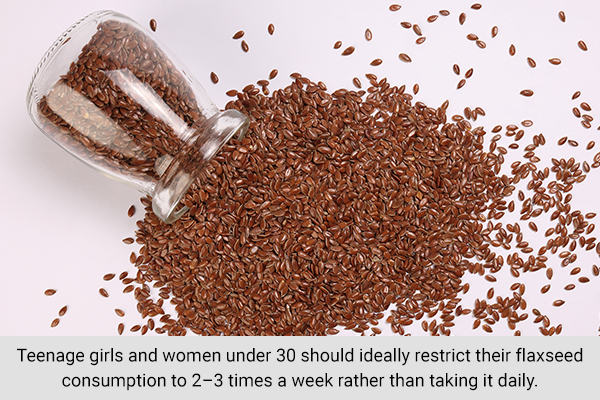
- Pregnant women and breastfeeding mothers should avoid taking ground flaxseeds or flaxseed supplements. The phytoestrogens can adversely affect the development of the fetus and might predispose your child to cancer later in life.
- Breast, ovarian, or uterine cancer survivors must steer clear of flaxseeds as its phytoestrogens can engender adverse effects, such as the growth of breast tissue.
- Similarly, women who have suffered in the past from hormonal-driven conditions, such as endometriosis and polycystic ovarian syndrome, should best avoid phytoestrogen-containing flaxseeds.
- Flaxseeds can also negatively interfere with the action of birth control pills or hormone therapy as their inherent phytoestrogens can disrupt or double up the effect of the estrogen.
- Teenage girls and women under 30 should ideally restrict their flaxseed consumption to 2–3 times a week rather than taking it daily.
- Owing to its phytoestrogen content, flaxseed consumption is not recommended for infants and young children.
- People taking blood thinners should consult their doctor before taking flaxseeds for health purposes as it can increase the risk of bleeding. Those suffering from prostate cancer, high triglycerides, hypothyroidism, and hormone-sensitive conditions should also take flaxseeds with caution.
- Flaxseed consumption might interfere with diabetes medications, and therefore it is well advised to consult your doctor before incorporating flaxseeds into your diet. Even if the doctor green-lights the use of flaxseeds to stabilize your blood sugar levels, you must make sure to monitor your blood sugar levels at close and regular intervals.
- When taking flaxseeds for health purposes, make sure to drink plenty of water; otherwise, it may cause gastrointestinal side effects.
- Do not take large amounts of flaxseeds as it may cause intestinal obstruction.
- It is also important to bear in mind that one can only derive the much-talked-about health benefits of flaxseeds if they are chewed properly, or else they will be rendered useless to your body. Particularly, for this reason, it may be useful to soak the seeds before consuming or simply have them in ground or powdered form. Besides, breaking down whole flaxseeds puts quite a strain on the intestines, which makes them the least preferable choice. Raw and unripe flaxseeds, on the other hand, are completely off-limits as their consumption can be toxic.
Expert Answers (Q&A)
Answered by Mr. Jonathan Valdez (RDN)
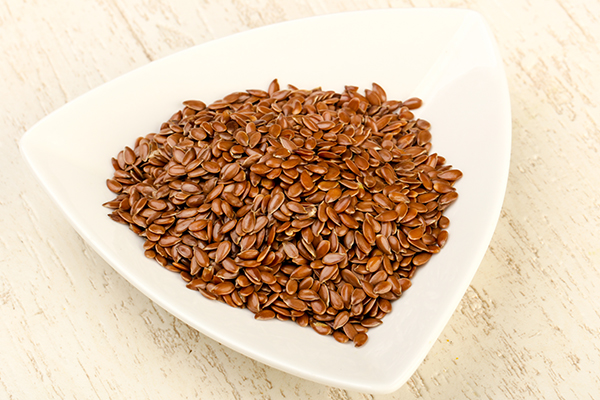
Info from Tufts University Health & Nutrition Letter:
Many are concerned that raw flaxseeds contain dangerous levels of cyanide, making it poisonous. We have nothing to be afraid of when it comes to raw flaxseeds. Small amounts of cyanide compounds can be found naturally in many foods, including cashews, almonds, some beans, and other plant products, as well as flax.
It is more likely that you will ingest these compounds raw, as heat will break them down. However, even when eaten raw, the body has the capacity to break down a certain amount of these cyanide compounds. It was discovered in 1994 that in healthy individuals, daily consumption of around 8 tablespoons was safe.
Those who have difficulty digesting high fiber foods and/or have a GI condition (colitis, Crohn’s, etc.) may need to avoid flaxseeds if the body finds it difficult to digest.
Consuming it in grounded form may be more bio-available versus in full form. However, both methods are overall healthful in moderation.
Flaxseeds are high in fiber, which can often help with constipation. However, you shouldn’t consume it in excess, as it can end up creating too much bulk and clogging your system.
Since flaxseeds contains lignin, which has been shown to reduce estrogen activity (which blocks the estrogen receptors located on the surface of fibroid smooth muscle cells), fibroid formation and growth is often inhibited. But these studies have only been done on animals and further research is warranted.
When dealing with fish oil:
It can be difficult to include it in your diet, eating 3 oz. of salmon, trout, or mackerel will get you about a gram’s worth. But, you would have to eat more than a pound of catfish to get the same amount.
Capsules are large and can have unsettling side effects: upset stomach, fishy tastes, higher LDL levels (if consuming several grams per day)
Mercury contamination is of concern: better if supplements are made from smaller fish (lower levels of mercury)
Flaxseed is often promoted as an amazing alternative to fish oil, it contains three omega-3 fats while fish oil only contains two. Flaxseed is the richest source of plant-based omega-3 alpha-linolenic acid (ALA). However, flaxseed oil has a pretty high omega-6 content. Omega-6 metabolism competes with ALA for some of the same enzymes. Therefore, ALA might not be reaching its full omega-3 potential if there is too much omega-6 present.
Serving sizes: a serving size for flaxseed oil is 6 capsules, while a single fish oil capsule will give you the same amount of omega-3. Bioavailability of flaxseed is lower compared to fish oil.
Overall: fish oil is going to give you more of omega-3 boost than flaxseed oil. However, this doesn’t mean flaxseed oil is “bad” for you. Flaxseed oil still has many other amazing properties.
Final Word
Flaxseeds are replete with omega-3 fats, fiber, and other nutrients that can help improve your health in different ways. In fact, this food may even be used as a low-risk intervention for certain illnesses: heart disease, cancer, mental illness, etc. You can incorporate it in your diet in many ways.
Ground or whole flaxseeds are often sold and can be kept on the shelf for over a year before being opened. Flax can be put into baked goods, breads, etc. Also, when mixed with water, flaxseed makes for a great egg alternative when making vegan baked goods.
Grinding up flaxseed makes its nutrients more readily available. Add it into your morning smoothie for an extra boost!
- Was this article helpful?
- YES, THANKS!NOT REALLY


